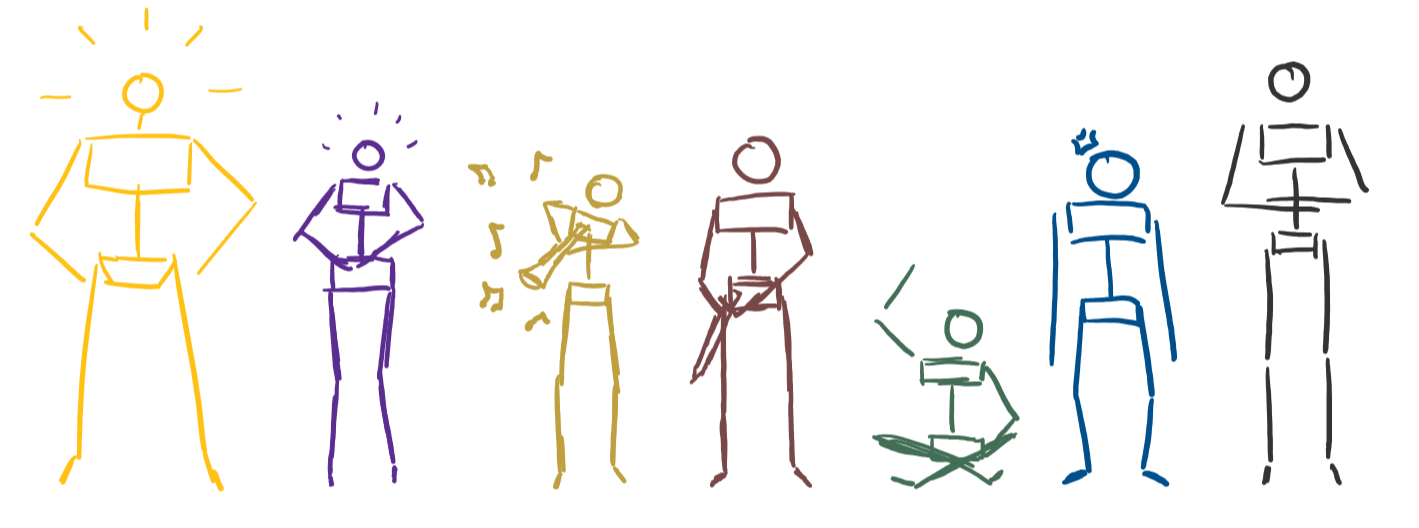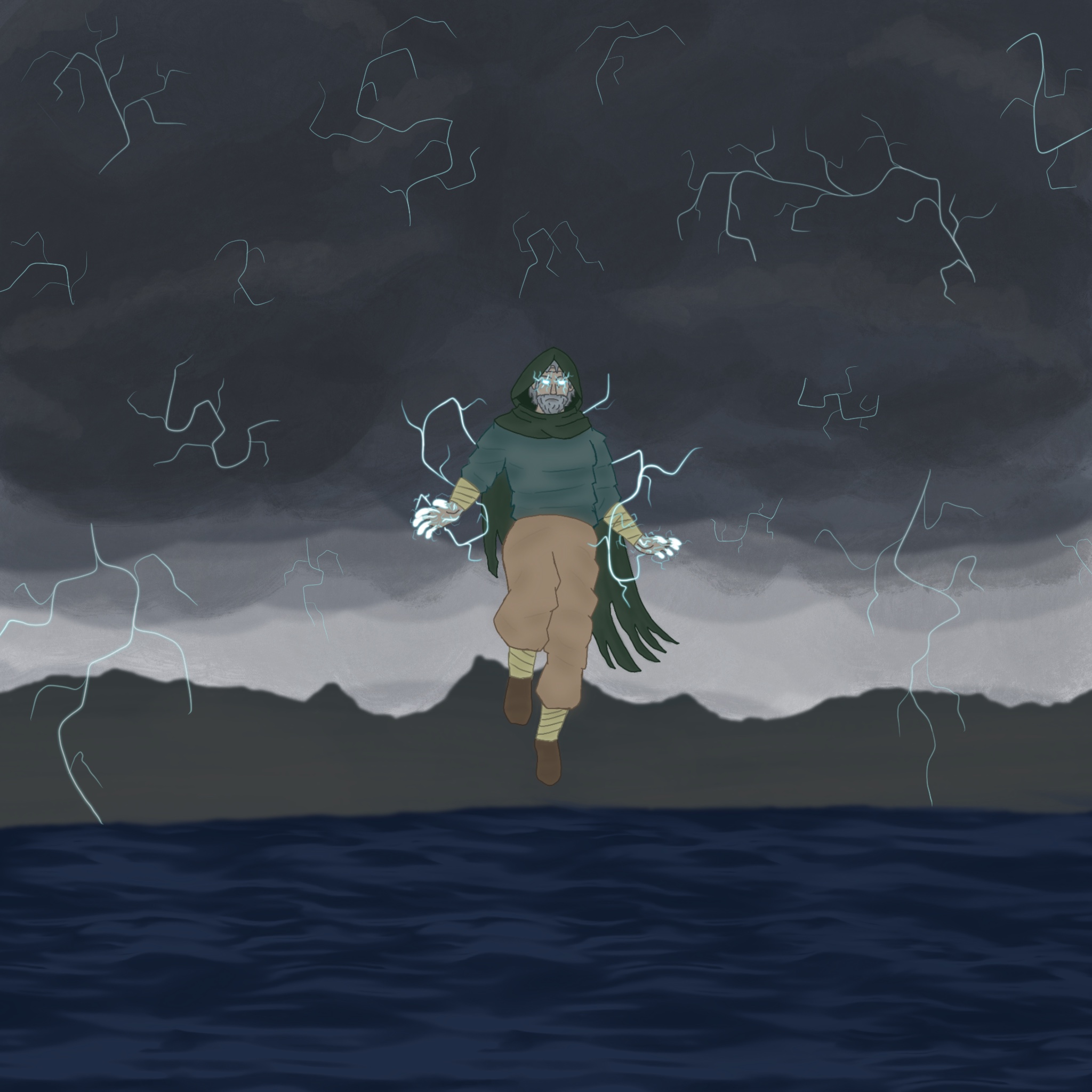
Members: The Champion, The Guardian, The Soldier, The Cultivator, The Poet, The Vagrant, The Guide
Species: gods
Relationships: Triastra (parents)
attribute 4: attribute 4
The Champion is the firstborn child of the Triastra, and is therefore the closest to the star-gods in divinity and radiance, worshipped as the most powerful god in the pantheon. While they may take mortal form from time to time, it is very rare, as their main job is embodying the sun in the sky during the day, providing heat and light to the world. As this is a difficult job, The Champion sleeps during the night.
Embodying the sun, The Champion represents speed and strength, and therefore any children who are especially strong or athletic are said to be born under the influence of The Champion. The Champion is the patron god of athletes and laborers.
Although they do not often take mortal form, when they do, they usually have sharper traits, like a strong jawline, defined muscles, or square shoulders. In addition, their body naturally radiates a soft glow. Their hair and skin are usually light and golden, contributing to their glow.
The Champion is strong-willed and incredibly straightforward, attempting to solve problems and rule with expediant judgement and power. However, this can lead to disputes between The Champion and The Soldier, as The Soldier tends towards slower, more rational judgements. As the most powerful of the pantheon, The Champion is not accustomed to being opposed, and when opposed, they can be quick to anger and hotheaded in retaliation. Despite this, mortals who interact with The Champion describe them as charismatic and friendly, their personality radiating alongside their appearance.
The Guardian is the secondborn child of the Triastra, and is therefore very close in radiance and divinity to the star-gods and worshipped as the secondmost powerful god in the pantheon. Their calm complements The Champion's vigor in ruling, as the moon complements the sun. The Guardian takes a more immanent approach than The Champion, often taking mortal form to deal with smaller mortal affairs. While The Champion shines during the day, The Guardian sleeps, sometimes waking and helping those in need. While The Champion sleeps during the night, The Guardian takes their place in the sky and provides light to the world.
Embodying the moon, The Guardian represents love and guards the homes of those who worship them, and any children born who are quick to love others or are especially empathetic are said to be born under the influence of The Guardian. The Guardian is the patron god of parents and lovers.
The Guardian takes mortal form during the day to assist mortals with their problems. The Gaurdian takes many forms, and their appearance changes depending one who sees them and what they need. The Guardian can take a parental form, or that of a protector, or a friend, or a lover. No matter their appearance, they radiate comfort and love, and many people are drawn to them.
[Role in pantheon (often misses meetings, too busy helping people), personality]
Thirdborn to the Triastra, The Soldier (and the star-gods following children) do not shine on their own, but rather take aspects and influences from the mortal world. The Soldier is known and worshipped for their reason and wisdom, however, their relationship is quite distant, as they prefer to remain on Mount Psilas and make decisions in divine court. The Soldier prefers to interact with mortals by giving them gifts through the form of technology or inspiration. However, this can be taken too far, and the Soldier may inspire mortals to start wars, seeing them as expendable, or give mortals gifts that can be used for destruction or evil.
As God of the Sword, The Soldier represents wisdom and technology, and therefore any children born with exceptional intellect or with tinkering and inventive natures are said to be born under the influence of The Soldier. The Soldier is the patron god of generals and armies, as well as inventors and blacksmiths.
The Soldier is not seen very often outside the royal court or the battlefield. When advising Latissan royals, The Soldier takes on a regal and powerful appearance, with armour and jewelry that demands respect. On the battlefield, The Soldier may be seen in the heat of battle, with armour and one of any weapon; their favorite being their sword, [sword name].
[personality and role]
The Cultivator and their twin, The Poet, were the next to be born of the star-gods. While one twin, The Poet, grew social and outgoing, the other, The Cultivator, grew reculsive and withdrawn. Instead of spending time among mortals or upon Mount Psilas, The Cultivator chooses to spend their time in the solitude of nature. Despite this reclusion, their relationship with mortals is very immanent, and they choose to grow and provide for mortals that are faithful, blessing health for crops and livestock. The Cultivator's ultimate priority and protection is given to nature, and they will not hesitate to choose the health and wellbeing of plants and animals over that of mortals. Simlarly, those who abuse or destroy nature may receive The Cultivator's careful wrath, and find themselves without food.
As the god of nature, The Cultivator is the representative of plants and animals, and any children who have a special relationship with plants or animals, or children who are especially good at climbing trees or catching bugs, are said to be born under the influence of The Cultivator. The Cultivator is the patron god of farmers and naturalists.
In mortal form, The Cultivator chooses a humble appearance, not caring about how they portray to mortals, but often having a more dark-skinned or hairy appearance, to protect from the sun or bugs (even though these do not harm them). They usually wear basic clothing, often tattered or covered in dirt. When among the trees, it is common for the Cultivator to wear no clothes at all, existing naturally while connecting and caring for nature. It is a common occurence for people to encounter them like this, and sighting The Cultivator in nature is said to be a sign of good fortune for crops and livestock.
[personality and role]
The twin of The Cultivator, The Poet, could not have been born any more different. The Poet is the most social of the pantheon, and spend most of their time in mortal form. They can normally be found playing music, painting, or performing on stages with mortals across Latis. The Poet loves interacting with mortals, and they love observing and fostering the creativity and fun inside every person. Because of this, they often ignore their responsibilities atop Mount Psilas, and are somewhat looked down upon by the other gods for their childish nature (often The Cultivator will have to advocate on their behalf in divine court). In addition, their priorities usually lie in mortal affairs, and they often give mortals special treatment, often causing problems by favoring some over others.
As the god of art, The Poet represents creativity and fun, and any children born who are exceptional artists or musicians, have an carefree or easygoing attitude, or are lovers of food, are said to be born under the influence of The Poet. The Poet is the patron god of artists, musicians, performers, and chefs.
The Poet has a very fluid appearance, but remains consistent in their effort to uphold their appearance and stand out amongst crowds. Whether this means being taller, fatter, scarier, having different hair or skin tones, or being mroe beautiful than everyone else in the room, The Poet will maintain an appearance that is recognizeable as that of a god. Like a stage performer, they will take on whatever role is necessary for them to play. Like an artist, they take pride in their craft and put effort into looking exactly as necessary. Like a musician, their voice is iconic and notable to those who hear it. The Poet keeps up with fashion, and often buys from mortal stores (the other gods think this is frivalous). Overall, The Poet's appearance is just as dynamic and flashy as their personality.
[personality and role]

The Vagrant, like a storm, is always moving. The penultimate child of the star-gods, The Vagrant was the first to leave Mount Psilas and venture forth into the world. The Vagrant does not spend most of their time on Mount Psilas, or with mortals, or in the sky, or on the sea, but on the road. The Vagrant's time is spent walking, flying, moving, and traveling, never staying in one place for too long. Disguised, they will travel to villages and cities across Latis, meeting locals and interacting with people of all sorts, but only for a short time. However, The Vagrant often brings storms after they visit, feared and respected by mortals for its life-giving rain and life-taking lightning.
As the god of storms, The Vagrant represents the seas and the sky, as well as the clouds and the weather. Any children who run away from home, who are adept swimmers (or flyers), or who look to the horizon with longing are said to be born under the influence of The Vagrant. The Vagrant is the patron god of travelers, adventurers, sailors, and oracles.
The Vagrant takes on many faces as they travel. The one connecting thread is that The Vagrant is never at home, and always takes the form of someone out of town. Sometimes The Vagrant will create a new appearance that does not correlate with any known species or people, becoming something truly unique. Mortals who see the Vagrant also notice the garments of an adventurer, with many packs and supplies, as if they have a long journey gone and a long journey up ahead. In addition, like a storm, the Vagrant can be chaotic and disorganized, but their sometimes harsh appearance can always be softened when presented with hospitality.
[personality and role]
The Guide is found in light and shadow, in morning and evening, in close and far, in chaos and order, in good and evil, in life and death. The final child of the star-gods, The Guide was born invisible, and only came to be seen as they grew up. However, ashamed of their appearance, and sometimes cast aside by their siblings, The Guide often chose to hide or cover themself, while diving into their craft. The Guide is almost never seen in mortal form, but nevertheless spends their time guiding mortals through life and death. According to myth, in their youth, The Guide crafted masks which are given life, becoming mortals. When mortals die, their soul leaves the mask, and that mask is inhabited by another soul, once again returning to the land of the living. The Guide leads mortals into life, giving them their mask when they are born, and the Guide leads mortals into death, collecting their mask when they die.
As the god of life, The Guide represents birth and death, and all children are born under the influence of The Guide. In addition, the influence of other gods is said to be due to their assistance in crafting the masks, as in their youth, they would help The Guide make somem masks. The Guide is the patron god of doctors and executioners, and, in old age, most believe the Guide to be their personal patron, as they prepare to give up their mask.
The Guide does not have a mortal form, and any glimpses are only witnessed by individuals who have had near-death experiences, or visions during childbirth. These rare witnesses describe different figures depending on the context.
[personality and role]